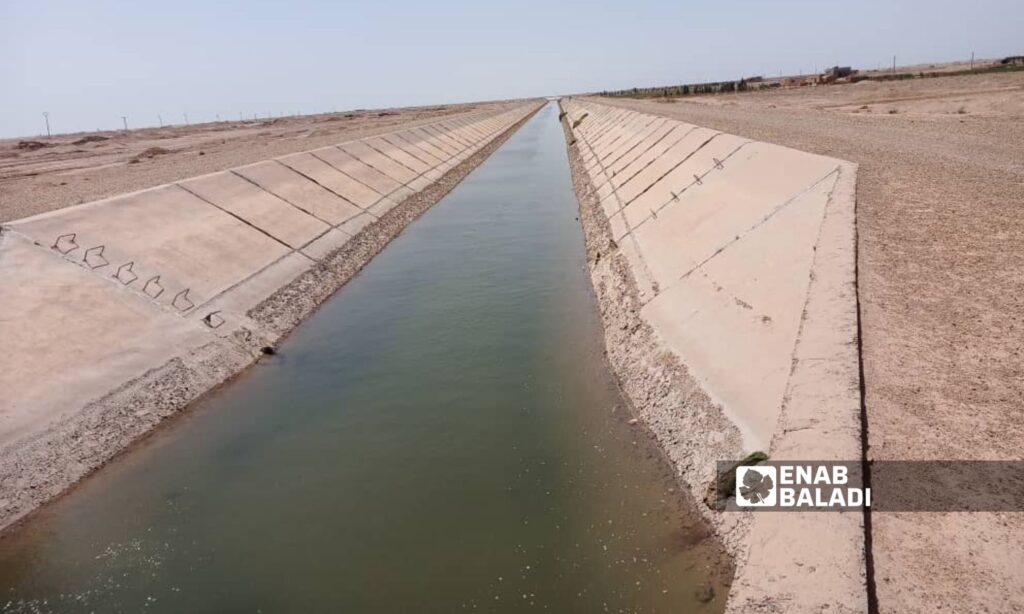About 20 villages and towns in the southern countryside of al-Hasakah have been suffering from a complete water cut for almost a month due to the shutdown of the al-Khabour water station as a result of ongoing maintenance works.
Enab Baladi‘s correspondent in al-Hasakah reported that the crisis erupted with the al-Khabour channel’s shutdown over a month ago due to multiple breakdowns, including the collapse of concrete slabs in the channel body in the village of Harijia, exacerbating the residents’ suffering especially with the beginning of summer.
The al-Khabour line extends from Harijia town, north of Deir Ezzor, to Markada town in the south of al-Hasakah.
Due to this, water has been cut off from the villages and towns of Janat, Markada, Sijar, Tayyib al-Fal, al-Hulwa, Hariji, al-Namlia, Abu al-Nitil, al-Sabai, al-Nashwa, al-Jasimi, Bseitin, Gharbiya Sharqiya, Muijel, Sheikh Hamad, al-Jaser, al-Kawashiya, and Markada Sharqiya, as confirmed by Enab Baladi’s correspondent in al-Hasakah.
Salih al-Ali, a resident of Markada Sharqiya village in the countryside of al-Hasakah, told Enab Baladi that the price of a barrel of non-potable water has reached 12,000 Syrian pounds in his village and the surrounding villages.
The price of a filtered water barrel reached 25,000 pounds, and it is not always available.
According to the S-P Today website, one US dollar is equivalent to 14,500 Syrian pounds.
Al-Ali added that residents are currently relying on treated water brought by tankers from the Basira and Sobha stations in Deir Ezzor countryside, making them prone to exploitation by tankers’ owners.
Activists from al-Hasakah province have circulated posts on Facebook appealing to residents of Deir Ezzor for help in securing water, given the high costs of water purchase in the area.
Enab Baladi tried to contact the Water Directorate in al-Shaddadi subdistrict, but the officials refused to comment without obtaining approval from the Media Department of the Autonomous Administration of North and East Syria (AANES).
Extension of a previous crisis
Mid-last year, residents of over ten villages in the northern countryside of Deir Ezzor suffered from the breakdown of water stations on the al-Khabour River, which supply more than ten villages in the northern countryside of Deir Ezzor.
Residents of the area, extending along the al-Khabour River up to the eastern bank of the Euphrates River, have complained for years about water shortages, forcing most of them to secure it through ten-barrel capacity tankers, with each “trip” costing between 30,000 and 40,000 Syrian pounds.
Most Syrian provinces, regardless of the controlling authorities, suffer from water shortages, notably al-Hasakah province, which the Autonomous Administration (the administrative authority there) declared as a disaster area due to severe water scarcity.
The Water Directorate in al-Hasakah announced in early July 2023 that the province, Tal Tamer, its villages, and the Washokani and Ras al-Ain camps were disaster-stricken areas, where life is nearly non-existent due to the water crisis.
They attributed the cause to the cessation of drinking water flow from the Alouk station located in Ras al-Ain city, which is under the control of the Turkey-backed Syrian National Army (SNA) factions.











